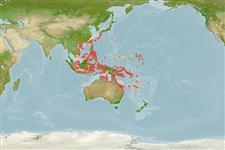Environment: milieu / climate zone / depth range / distribution range
البيئة
بحري مرتبطة بالشعاب; نطاق العمق 1 - 20 m (Ref. 1602). Tropical; 32°N - 32°S, 104°E - 173°E
Western Pacific: north to southern Japan, south to New South Wales, Australia and east to Fiji and the Marshall Islands.
الحجم / وزن / العمر
Maturity: Lm ? range ? - ? cm
Max length : 23.0 cm TL ذكر/ مختلط الجنس; (Ref. 42740)
الأشواك الظهرية (المجموع) : 5; الأشعة الظهرية الناعمة (المجموع) : 21; شوكة شرجية: 1; أشعه شرجية لينه: 17. This species is distinguished by the following characters: D V,21; A I,17; 14-16 (rarely 14 or 16) pectoral rays; 44-50 lateral-line scales; 2-3 + 6-8 gill rakers; 5-6 predorsal scales; ctenoid scales on cheek, 7-8 horizontal rows; 10 canine teeth at front of lower jaw, most posterior large and recurved; vomer teeth in a semicircular patch; with palatine teeth; a prominent sharp spine at upper edge of subopercle; posterior edge of preopercle usually irregular to finely serrate while edge of subopercle and upper edge of interopercle sometimes finely serrate, especially in large adults; body depth 4.0-4.35 in SL (23.0-25.0% SL); middle dorsal spine longest, 8.7-10.2% SL; membrane from last dorsal spine joined near base of first soft ray; caudal fin slightly rounded, 20.3-22.8% SL. Best recognized by the series of 10 quadrangular dark brown blotches along its back, progressively shorter posteriorly, each with a darker brown spot at upper corners that merge with small black spots at base of dorsal rays; the first five blotches are joined basally by a wavy dark brown stripe, its upper parts touching lateral line; ten dark brown bars on lower part of body, broadest in the middle, linked in the broad upper part by two horizontal series of dark brown blotches; narrow upper end of each dark bar joining corresponding lower part of above-mentioned wavy stripe, thus isolating a series of ten large roundish pale spots which may contain dark brown blotches or small dark spots; a narrow dark brown bar below middle of eye, sometimes a second less distinct one below front of eye; a dark line from upper lip to eye; a median brown band on upper lip, edged in dark brown; a large black spot basally on dorsal fin between spines; II and V; caudal fin usually yellow or yellowish with numerous very small black spots, a narrow white posterior margin and black submarginal line; males usually with a dark spot of side of upper lip (one female found with one) (Ref. 57562).
Found in sheltered bays, harbors and lagoons, but mainly clear water habitats (Ref. 48636). Occurs on sand, rubble, seagrass, or weedy bottoms near shallow reefs (Ref. 42740, 48636). Common in seagrass beds (Ref. 9710). Also Ref. 58652.
Life cycle and mating behavior
Maturities | التكاثر | Spawnings | Egg(s) | Fecundities | Larvae
Randall, J.E., G.R. Allen and R.C. Steene, 1990. Fishes of the Great Barrier Reef and Coral Sea. University of Hawaii Press, Honolulu, Hawaii. 506 p. (Ref. 2334)
IUCN Red List Status (Ref. 130435)
استخدامات بشرية
مصائد: غير مهمة تجارياً; حوض مائي: احواض مائية عامة
أدوات
تقارير خاصة
Download XML
مصادر علي الأنترنت
Estimates based on models
Preferred temperature (Ref.
123201): 24.7 - 29.3, mean 28.5 °C (based on 2027 cells).
Phylogenetic diversity index (Ref.
82804): PD
50 = 0.5000 [Uniqueness, from 0.5 = low to 2.0 = high].
Bayesian length-weight: a=0.00776 (0.00470 - 0.01281), b=3.06 (2.92 - 3.20), in cm total length, based on LWR estimates for this species & Genus-body shape (Ref.
93245).
مستوى غذائي (Ref.
69278): 3.0 ±0.4 se; based on diet studies.
المرونه (Ref.
120179): عالي, الحد الزمني الأدني لتضاعف عدد أفراد المجتمع أقل من 15 شهر (Preliminary K or Fecundity.).
Fishing Vulnerability (Ref.
59153): Low vulnerability (13 of 100).
Nutrients (Ref.
124155): Calcium = 138 [70, 267] mg/100g; Iron = 1.15 [0.60, 1.98] mg/100g; Protein = 18.2 [15.8, 20.2] %; Omega3 = 0.0819 [, ] g/100g; Selenium = 53.9 [22.5, 127.5] μg/100g; VitaminA = 28 [8, 104] μg/100g; Zinc = 2.12 [1.29, 3.28] mg/100g (wet weight);
